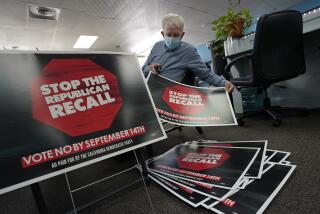Seeds of an Uprising
- Share via
The recall against Gov. Gray Davis has been dismissed as the toy of a rich conservative, Rep. Darrell Issa (R-Vista), whose self-promotion got out of hand. That scenario has a kernel of truth, but the recall also represents something larger: a people’s uprising against business as usual in Sacramento. Californians are unhappy about budget deadlock, taxes, workers’ compensation costs, business regulation, special interests, out-of-control campaign fund-raising and what has been colorfully described as “puke politics.”
It is important that this political force be used for real solutions that will do more for California than simplistically recalling a governor. The changes needed to make state government functional again are not that numerous, just difficult to get past the political haze of Sacramento. They include:
* Repealing or loosening term limits. Politicians are more beholden than ever to contributors and see no political gain in trying to solve long-term state problems. Elected representatives no longer fully grasp the basics of budgeting and regulatory oversight.
* Turning legislative redistricting over to the state Supreme Court or a special commission. Politicians do it now, making safe districts for themselves. Over time, the primary-voting faithful of each party push the seat farther to the left or the right. Moderates can no longer be elected. The result? Think reflexive liberal Assemblywoman Jackie Goldberg on the left and Assembly GOP Leader Dave Cox, who always puts ideology first, on the right.
* Amending Proposition 13, not to increase tax rates but to make it harder for corporations to escape reassessment. Homeowners can’t disguise a sale as a 100-year lease, so why should banks and insurance companies be able to?
* Amending the state Constitution to make it harder to place voter initiatives on the ballot and to recall officials. The initiative process has been hijacked by special interests, from casino operators to labor unions. Sponsors today don’t bother with volunteers; they “buy” qualifying signatures by deploying an army of paid signature gatherers.
* Plug the loopholes that encourage corrupt relationships in which politicians shake down contributors and pay them back with favors at the citizenry’s expense. Davis has been a master, but is far from the only one.
Another chronic contributor to the state’s political deadlock is the requirement that two-thirds of legislators must pass the annual state budget. The budget that finally emerged this year will leave the state with $8 billion of new debt because not one Republican would vote for a plan to cut most state programs but also temporarily raise income and tobacco taxes.
A ballot initiative sponsored by Democrats and already in circulation would lower the threshold for passing a budget or raising taxes to a 55% vote, still higher than the simple majority required in all but three states. Republicans call the measure a blank check to tax and spend more. Both parties share blame for the state’s deep hole of debt, but the measure’s sponsors should agree to delay and incorporate it in a broader package that could be put to voters by 2004.
All these reforms, combined, would restore meaning to “majority rule,” and give moderates a better chance of participating in governing California. It’s unlikely that today’s polarized Legislature would put what’s needed on the state ballot. However, groups such as Common Cause and the League of Women Voters know a lot about initiative campaigns. They could start now.
To Take Action: Common Cause (800) 926-1064 or e-mail gward@commoncause.org; League of Women Voters (916) 442-7215 or e-mail lwvc@lwvc.org.
More to Read
Get the L.A. Times Politics newsletter
Deeply reported insights into legislation, politics and policy from Sacramento, Washington and beyond. In your inbox twice per week.
You may occasionally receive promotional content from the Los Angeles Times.










